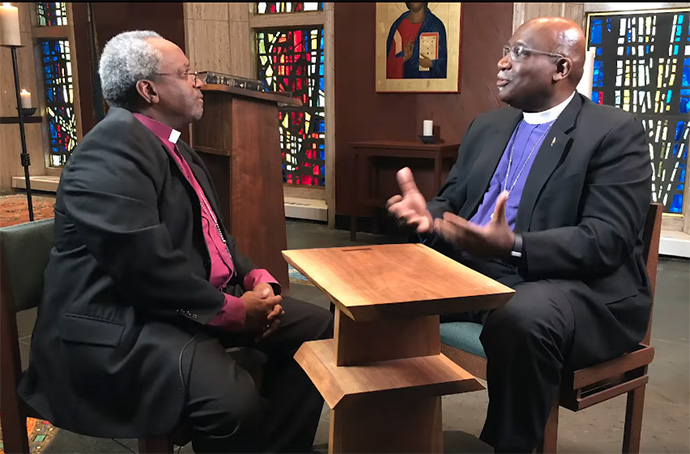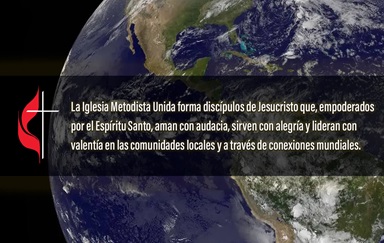
El obispo metodista unido Gregory Palmer (derecha) y el obispo presidente de la Iglesia Episcopal, Michael Curry, discuten la plena comunión entre las dos denominaciones en 2019. El acuerdo propuesto está en pausa, por ahora, debido a interrupciones relacionadas con la pandemia del COVID-19. Captura de pantalla del archivo del video cortesía del Concilio de Obispos/as/as de la Iglesia Metodista Unida
(IMU). Citando la amenaza constante de la pandemia, los/as metodistas unidos/as y los/as episcopales han dejado en suspenso los planes para concretar la plena comunión entre ambas denominaciones.
Los líderes de ambas denominaciones inicialmente habían propuesto adoptar un acuerdo de plena comunión, cuando sus principales órganos de toma de decisiones se reunieran este año y el próximo.
“El inicio de la pandemia de COVID-19 con sus disrupciones radicales ha hecho necesario, lamentable pero comprensiblemente, un reprogramación de esta línea de tiempo”, dijo el Comité de Diálogo Metodista Unido- Episcopal en un comunicado el 17 de septiembre.
La amenaza de la enfermedad ya ha tenido como resultado el aplazamiento de la Conferencia General de la Iglesia Metodista Unida (IMU), que estaba pautada para mayo de 2020 y ha sido reprogramada entre el 29 de agosto y el 29 de septiembre de 2021 en la ciudad de Minneapolis, estado de Minnesota; mientras que La Iglesia Episcopal está reconsiderando el formato y el calendario de su próxima Convención General actualmente programada para julio de 2021.
Con todos estos cambios en mente, el comité de diálogo ahora recomienda que ambas denominaciones esperen para concretar el acuerdo de plena comunión hasta después de estos eventos denominaciones en el 2021. El comité incluye cinco líderes de cada denominación, así como un miembro del personal de la IMU y dos de la Iglesia Episcopal.
“Nuestro trabajo continuo hacia la unidad en la mesa de Cristo continúa. No recomendamos un retraso en la acción de la plena comunión a la ligera. Este trabajo es un signo externo y visible de la gracia que busca acabar con todas las divisiones en la familia humana”, dijo el comité.
El aplazamiento se produce en medio de la disyuntiva que atraviesa La Iglesia Metodista Unida sobre su futuro. La próxima Conferencia General enfrenta múltiples propuestas para resolver el largo debate de la denominación sobre la inclusión de personas LGBTQ, lo que a dividido a la denominación en grupos con diferentes perspectivas teológicas.
Esa incertidumbre combinada con el nuevo calendario de reuniones jugó un papel en la recomendación del comité, dijeron dos de los/as miembros metodista unidos/as de este cuerpo.
Work toward full communion
The full-communion proposal, “A Gift to the World: Co-Laborers for the Healing of Brokenness,” has already been submitted as General Conference legislation. It is on Pages 834-841 in the Advance Daily Christian Advocate.
In a video recorded in 2019, United Methodist Bishop Gregory V. Palmer (co-chair of the dialogue committee and leader of the West Ohio Conference) chats with the Episcopal Church’s presiding bishop, Michael Curry, about the relationship between the two denominations.
The two denominations also have an Interim Eucharistic Sharing Agreement that encourages joint celebrations of the Lord’s Supper.
Read Council of Bishops press release on the pause in full communion plans.
Trabajando en el camión hacia la comunión plena
En su reunión de mayo del año pasado, los/as obispos/as metodistas unidos/as no debatieron acerca del proceso profundización de los vínculos con la Iglesia Episcopal, mientras que se cuestionaron el futuro de la unidad metodista unida. Por voto unánime, el Concilio de Obispos/as aprobó la presentación del acuerdo de comunión plena a la Conferencia General.
La propuesta de plena comunión, “Un regalo para el mundo: Colaboradores para la curación del quebrantamiento”, ya se ha presentado como legislación de la Conferencia General. Está en las páginas 834-841 del Advance Daily Christian Advocate.
En un video grabado en 2019, el obispo metodista unido Gregory V. Palmer (copresidente del comité de diálogo y líder de la Conferencia de West Ohio) conversa con el obispo presidente de la Iglesia Episcopal, Michael Curry, sobre la relación entre las dos denominaciones.
Las dos denominaciones también tienen un acuerdo interino de intercambio eucarístico que fomenta la celebración conjunta de la Cena del Señor.
Lea el comunicado de prensa del Concilio de Obispos/as sobre la pausa en los planes de comunión plena.
“Los/as metodistas unidos/as en el comité de diálogo reconocen que necesitamos tener más claridad sobre el futuro de La Iglesia Metodista Unida antes de pedir a La Iglesia Episcopal que tome una decisión sobre esta relación de comunión plena”, dijeron en un correo electrónico el Obispo Gregory V. Palmer y el Rev. Kyle Tau, oficial de asuntos ecuménicos del Concilio de Obispos/as.
Palmer, quien dirige la Conferencia Anual del Oeste de Ohio, es copresidente del comité de diálogo: “Nuestro compromiso mutuo con estas conversaciones sigue siendo inquebrantable y esperamos aprobar esta propuesta de comunión plena en la próxima oportunidad que tengamos”, dijeron Palmer y Tau.
Mientras tanto, ellos y otros/as miembros del comité de diálogo instan a la colaboración continua de sus iglesias en el ministerio, especialmente en los esfuerzos hacia la justicia racial. El acuerdo propuesto por el grupo lleva el título de "Un regalo para el mundo: Trabajando juntos/as por la sanación ante el quebrantamiento", y ambas iglesias están de acuerdo en compartir un llamado común para la restauración del tejido social.
“A medida que avanzamos hacia el futuro, es crucial que encontremos tantas áreas como sea posible para unirnos en una misión y un ministerio compartidos. Creemos que las pandemias tanto del COVID-19 y como de la injusticia racial, son tan urgentes en este momento que exigen una intencionalidad especial entre los socios ecuménicos para garantizar que estemos hablando y actuando con un propósito común".
La plena comunión no es una fusión donde las denominaciones se vuelven una, como cuando se formó La Iglesia Metodista Unida en 1968, sino que cada iglesia reconoce a la otra como compañera en la misión y la difusión de la fe cristiana, reconociendo la validez del bautismo y la Eucaristía de cada una, al mismo tiempo en que se comprometen a trabajar juntas en el ministerio. Dicho acuerdo también significa que episcopales y metodistas unidos/as pueden compartir clérigos/as.
La Iglesia Metodista Unida ya tiene acuerdos de plena comunión con la Iglesia Evangélica Luterana en América (ELCA por sus siglas en ingles), cinco denominaciones metodistas históricamente negras y la Iglesia Morava en América del Norte.
El diálogo metodista unido - episcopal, que data de 2002, tiene como objetivo unir a dos iglesias que tienen vínculos históricos desde los tiempos de la Iglesia de Inglaterra de Juan Wesley.
Un acuerdo de comunión plena entre los dos también completaría una especie de plataforma ecuménica. Como los/as metodistas unidos/as y los/as episcopales ya tienen plena comunión con luteranos/as y moravos/as, la única línea que falta en este cuadrilátero de la iglesia es entre las dos denominaciones con posiblemente el patrimonio más compartido.
Las dos iglesias se separaron mas por los efectos de la revolución estadounidense que por diferencias teológicas.
Juan Wesley siguió siendo sacerdote de la Iglesia de Inglaterra hasta el final de sus días. Pero a raíz de la guerra, dio el paso poco ortodoxo de nombrar líderes del clero en la nueva nación justo cuando muchos sacerdotes de la Iglesia de Inglaterra se dirigían de regreso a la Gran Bretaña. Los esfuerzos de Wesley llevaron al nacimiento en 1784 de una nueva denominación estadounidense que eventualmente se convertiría en La Iglesia Metodista Unida con presencia e varis países del mundo.
La Iglesia Episcopal, que mantendría sus estrechos vínculos con la Iglesia de Inglaterra, se inició oficialmente en los Estados Unidos cinco años después.
Ambas denominaciones también han luchado contra el pecado del racismo.
Las iglesias comparten antepasados comunes como Richard Allen y Absalom Jones, quienes dejaron La Iglesia Episcopal Metodista de San Jorge, en Filadelfia, debido a la discriminación racial. Los dos líderes afroamericanos de la iglesia también eran héroes de primera línea que todavía enfrentaban el fanatismo después de brindar atención durante una terrible epidemia de fiebre amarilla en 1793.
El Obispo Allen fundaría lo que se convertiría en La Iglesia Episcopal Metodista Africana. Jones se convertiría en el primer sacerdote afroamericano ordenado en la Iglesia Episcopal.
Unos 200 años después, tanto La Iglesia Metodista Unida como La Iglesia Episcopal se han enfrentado cada una a sus propias disputas sobre el papel de los/as cristianos/as LGBTQ en la vida de la iglesia.
Suscríbase a nuestro nuevo boletín electrónico en español y portugués UMCOMtigo
Entre las propuestas que se dirigen a la próxima Conferencia General se encuentra el “Protocolo de Reconciliación y Gracia a través de la Separación” que permitiría a las iglesias y conferencias tradicionalistas irse con sus propiedades y formar una denominación separada, utilizando $ 25 millones en fondos metodistas unidos. Palmer fue uno de los negociadores del protocolo, que incluyó a metodistas unidos con puntos de vista muy diferentes sobre la inclusión LGBTQ.
La Asociación Pacto Wesleyano (WCA por sus siglas en ingles) ha continuado sus planes durante todo el verano para formar esa nueva denominación tradicionalista.
La Iglesia Episcopal ya paso por un proceso similar. Actualmente la denominación ordena a clérigos/as abiertamente homosexuales y permite a sus sacerdotes/as oficiar bodas entre personas del mismo sexo. Sin embargo, los/as episcopales que no estuvieron de acuerdo con estos cambios, e incluso con la ordenación de mujeres, se separaron para formar la Iglesia Anglicana en América del Norte.
Los/as metodistas unidos/as y los/as episcopales han continuado dialogando incluso en medio de sus propias divisiones internas.
Ahora, el comité insta a que se trabaje por la unidad en el contexto más amplio de abordar las necesidades de salud, justicia racial y la reconstrucción del tejido social: “Mientras nuestras iglesias lidian con todas las interrupciones que conlleva este tiempo, oramos para que continuemos buscando la unidad a la que Cristo nos llama, para que el mundo crea. Los desafíos que enfrentamos actualmente exigen que el cuerpo de Cristo demuestre su unidad ante la sociedad de maneras tangibles que contribuyan a la sanación y la justicia en nuestro mundo quebrantado", dijeron Palmer y Tau a Noticias Metodistas Unidas.
* Hahn es reportero de noticias multimedia para United Methodist News. Comuníquese con ella al (615) 742-5470 o newsdesk@umnews.org.
** El Rev. Gustavo Vasquez es el Director de Noticias Metodistas Unidas para la audiencia hispano/latina. Puede contactarle al (615)742-5155 o por el correo: gvasquez@umnews.org. Para leer más noticias metodistas unidas, suscríbase gratis a UMCOMtigo, un resumen semanal de noticias y recursos comunicaciones.



